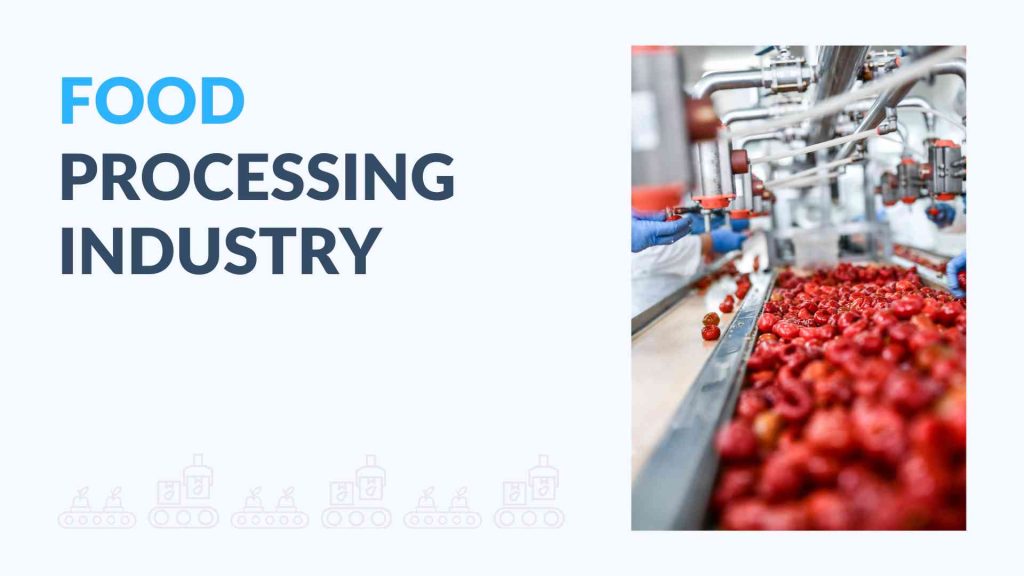The food processing industry is continuously growing to meet the changing needs of consumers, improvements in technology, and shifting global trends. Several noteworthy trends have emerged in recent years, reshaping how food is processed, packaged, and distributed.
Despite economic uncertainty, the U.S. food production industry is thriving. It has 22,407 companies that provide 1.5 million jobs and average annual combined sales of $1.8 trillion. Although certain subindustries face challenges, this industry continues to grow despite them.
The food market, valued at $974.9 billion in 2023, is foreseen to grow at a compound annual growth rate (CAGR) of 3.79% during the forecast period (2023-2028). The confectionery and snacks segment accounted for the most significant revenue share in 2018 and is estimated to retain its leading role throughout the forecast period.
We will dig into some of the most influential trends in the food processing industry and their impact on businesses and consumers.
Challenges Process Manufacturers Face
- Strict Industry Regulations
- Product Inconsistencies
- Wasted Materials
- Environmental Consciousness
- Lack of Supply Chain Transparency
Health and Wellness Focus
Consumers are becoming increasingly health-conscious, seeking out foods that are not only delicious but also nutritious. This trend has increased demand for minimally processed, organic foods. Food processors are responding by developing products with cleaner labels, fewer additives, and more transparent sourcing information. Additionally, there’s a growing emphasis on fortifying processed foods with functional ingredients like probiotics, vitamins, and plant-based proteins to enhance their nutritional value.
Sustainable Practices
Sustainability has become a core concern for consumers and businesses alike. The food processing industry is no exception, with companies striving to reduce their environmental footprint. This includes initiatives to reduce food waste, use eco-friendly packaging materials, implement energy-efficient processes, and source ingredients responsibly. As consumers become more eco-conscious, they are also willing to pay a premium for products with sustainable credentials.
Plant-Based and Alternative Proteins
The plant-based revolution is reshaping the food processing industry. Beyond meat substitutes, companies are exploring various plant-based dairy, eggs, and seafood alternatives. Advances in food science and technology have allowed the creation of products that closely mimic the taste and texture of animal-based foods. The popularity of plant-based diets and concerns about the environmental impact of traditional animal agriculture are driving this trend.
Clean Label and Transparency
Consumers are increasingly scrutinizing product labels and ingredient lists. They are demanding transparency regarding the sourcing and processing of food products. The clean label movement focuses on removing artificial additives, preservatives, and chemical ingredients from processed foods. Food processors respond using simpler, recognizable ingredients and providing detailed information about their supply chains.
Personalization and Customization
With the rise of data analytics and AI, food processors can tailor products to individual preferences and dietary requirements. Customized meal kits, personalized nutrition plans, and online ordering platforms are becoming more prevalent, allowing consumers greater control over what they eat.
Automation and Robotics
The food processing industry embraces automation and robotics to enhance efficiency, reduce labor costs, and improve product quality. Automated systems can take repetitive jobs such as sorting, packaging, and quality control quickly and more accurately than human workers. Robotics is also making its way into food preparation, with automated cooking and burger-flipping machines in fast-food establishments.
Food Safety and Traceability
Food safety remains a leading priority in the food processing industry. Technological advances, such as blockchain and QR code tracking, are being used to enhance traceability and ensure the safety of products. These tools allow consumers to trace the origin of their food from farm to table, helping to quickly identify and address potential contamination issues.
The food processing industry is experiencing a change caused by consumer preferences, sustainability concerns, technological advancements, and changing dietary choices. As these trends continue to evolve, businesses in the industry must adapt to stay competitive.
Consumers can look forward to a broader variety of healthier, more sustainable, and personalized food options in the future. The food processing industry will play a crucial role in shaping the future of our food supply and addressing the challenges of a rapidly changing world.
How Can Acumatica Help?
Acumatica cloud ERP can significantly enhance a food processing business by providing a comprehensive platform that streamlines operations and improves efficiency. It enables real-time visibility into inventory management, allowing for better control of raw materials and finished goods. Integrated financial and accounting modules facilitate accurate cost tracking and financial planning.
Acumatica’s production planning and scheduling tools also optimize production processes, reducing waste and enhancing overall productivity. Its robust reporting and analytics capabilities enable data-driven decision-making for improved quality control and compliance with food safety regulations.
Ultimately, Acumatica cloud ERP empowers food processors to optimize their supply chain, reduce costs, enhance product quality, and achieve greater profitability in a competitive industry. Are you in the Food business looking for an ERP solution? Contact us for a customized ERP.

Sangeetha brings 20 years of experience in Information Technology which includes Solution architecting, building micro services, research, and evaluation of business applications, integrating apps.

